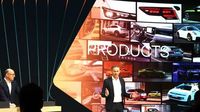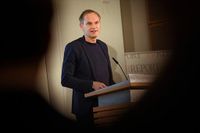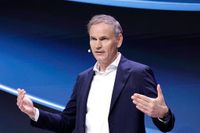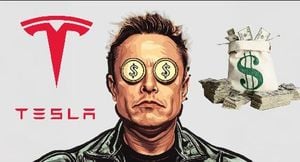On a pivotal day in the world of automotive innovation, Volkswagen's CEO, Oliver Blume, confirmed significant plans for the future of electric vehicles at the company. During the annual press conference held on March 18, 2025, in Wolfsburg, Blume announced that production for the Scalable Systems Platform (SSP) will take place at the Kassel plant located in Baunatal, Germany. This strategic decision underlines VW's commitment to a new era of transportation dominated by electric power, with projections estimating the construction of one million units annually. "It is a really large scope," Blume remarked, indicating the scale of the initiative.
The SSP will serve as the foundation for all forthcoming electric models within the Volkswagen Group. As stated by Blume, the platform promises versatility, catering to various segments and making its debut with the newly unveiled ID.Every1, priced at approximately €20,000. This key model signals a competitive entry into the EV market, with additional vehicles expected to launch around the €25,000 mark at the IAA 2025 in Munich. It's a bold move, especially as VW restructures its business model to address the evolving automotive landscape.
Adding to the excitement, the involvement of the Kassel plant will not only focus on production but will also position it as a development hub for this new drive technology, which includes a cutting-edge pulse inverter being implemented in the production process. Industry experts see this as a promising sign of investment in electric mobility. Jörg Fenstermann, manager of the Kassel plant, echoed Blume's sentiments: "The electrification of mobility presents an enormous opportunity for us at Volkswagen Group Components in Kassel." This is a clear indication of the plant's future role in shaping the company's electric ambitions.
However, amidst this optimistic news, VW is still grappling with challenges at its other facilities. Controversies loom over the production lines in Osnabrück and Dresden, where significant changes are on the horizon. By 2026, car production will cease at the prestigious Gläserne Manufaktur in Dresden, and the T-Roc production in Osnabrück is also set to conclude in 2027. These developments raise eyebrows over the future viability of these plants, with some speculating potential closures or asset sales could be on the table.
Moreover, VW's profitability has suffered a sharp contraction, with a 31 percent drop from the previous year, bringing profits down to €12.4 billion. Blume attributed this downturn primarily to intense competition in key markets like China and the escalating costs associated with transitioning the company's production line. This stark decrease has also prompted a lower than anticipated dividend, further impacting shareholder expectations.
In light of the economic pressures and the ongoing restructuring, Blume remains focused on the future. During a recent interview, he stated that VW is exploring a wide array of options, including potentially entering the military vehicle market as a means to diversify and stabilize revenue streams. "We are looking at the necessities if, for example, military vehicles should come into consideration," Blume said, emphasizing that no formal discussions with the arms industry have commenced. Nonetheless, he hinted at a readiness to entertain such discussions should the opportunity arise.
Despite these exploratory ventures into military production, VW is also steadfast about maintaining a customer-centric approach to electric mobility. Blume expressed confidence that the launch of smaller electric models could rejuvenate the company's sales and operational momentum: "We are prepared if customers switch to electric mobility." However, he did call upon the German government for greater support for the charging infrastructure and energy costs, citing that the current pricing in Germany is less competitive compared to other European nations. These challenges underline the necessity for a collaborative effort in promoting electric vehicle adoption across Europe.
Amidst the discussions of expansion, there are looming concerns about job security for thousands of employees at VW. Blume confirmed that as part of the Company’s restructuring efforts, they are anticipating 35,000 job reductions across various German locations by the year 2030. Currently, the Kassel plant employs approximately 15,100 individuals, with around one-third already working in roles related to electric mobility. Anticipating these transitions, Blume and CFO Arno Antlitz underscored the need to ensure that productivity and quality are not compromised, even with a reduced workforce. Antlitz noted, "We must also continue to be able to produce cars of the same quality with fewer employees," a sentiment reflecting the sensitive nature of the industry’s labor landscape.
As VW navigates both opportunities in electric mobility and the challenges of restructuring, its commitment to adapting and growing within this evolving market landscape is certainly evident. The immediate focus remains clear: the successful rollout of the SSP and the anticipation of new electric models that promise to reshape its market positioning in a significantly competitive environment. Only time will tell if VW can effectively juggle the push for innovation while managing operational challenges amidst a rapidly changing automotive industry.






